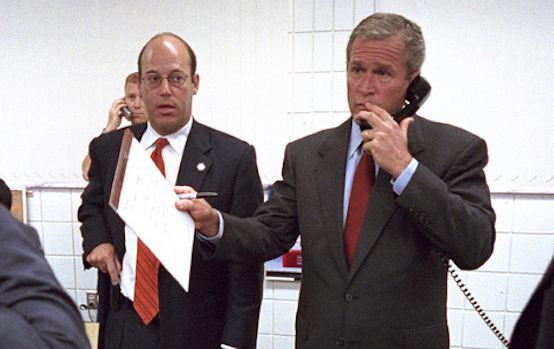It’s 2004 Again

He cut a figure back then, much like he does now as president.
Joe Biden, a 30-year Washington man well over the hill, was making the case for a change of course in the Middle East. It was a course he once believed in, and voted for, but no longer.
Biden wasn’t going to be president. Senator John Kerry was going to be president. Biden, perhaps, would get the nod for secretary of State from his old comrade. “They pick something, and they blow it out of proportion,” Biden told The Daily Show host Jon Stewart in the summer of 2004. “Create a sense of urgency for us to get to war on false pretenses.”
But the debates of that July during a doomed presidential campaign echo loudly in the discourse of an August 17 years later, when Biden is president. Kerry did get that office in the West Wing, just not the Oval, and it is Biden who will ensure American troops come home, just from Afghanistan, not Iraq. If you had gone to sleep and woken up like Washington’s Brood X cicadas, you might conclude nothing—even after the then-improbable presidencies of Barack Obama and Donald Trump—had changed.
Maybe nothing has.
After the U.S. finally ensured its exit from Afghanistan this week, the premier center-right editorial page of the country, the Wall Street Journal‘s, hosted a Star Wars cantina of the champions of the old course: Eliot Cohen, the Bush administration official and neocon eminence grise; Richard Haass, also of the Bush White House and president of the Council on Foreign Relations; Rory Stewart, member of Parliament and Don Quixote globalist; Husain Haqqani, Islamabad’s former man in D.C. With choice honorable exceptions, Fox News’s coverage was worse.
For the first time as president, Biden has the press against him, inviting the question after 2020 and 2021—in a smartphone-connected, locked-down world—whether only moral outrage merchants and quick panic artists can carry the day. The optimistic view: It’s still unclear.
What’s clearer: In securing infrastructure spending, but especially in demanding exit from Afghanistan, President Biden has convulsed an American right wing that was for years convulsed by “Trumpism,” a somewhat transpartisan movement that demanded projects at home and more choosy projection abroad.
“The conservatives are going to go crazy. I’m the guy pushing a trillion-dollar infrastructure plan,” future White House chief strategist Steve Bannon told Michael Wolff of the Hollywood Reporter in the days after his and Trump’s triumph in 2016. “With negative interest rates throughout the world, it’s the greatest opportunity to rebuild everything. Shipyards, ironworks, get them all jacked up. We’re just going to throw it up against the wall and see if it sticks. It will be as exciting as the 1930s, greater than the Reagan revolution.” Peter Thiel lamented at the Republican National Convention that year: “Instead of going to Mars, we have invaded the Middle East.”
Needless to say, the real policy ideas that animated Trump’s rise remain unconsummated. But, in this media environment, Biden, if he’s clever—and he’s clever enough to become president—could very well steal Trump’s thunder.
There is one critical distinction between now and the heyday of neoconservative fever: a Democrat, not a Republican, is in the White House. The right, then, is somewhere between its cleanest look yet at President Biden, and collapsing upon itself in naked contradiction. If you’re keeping score at home, Trump’s friend Nigel Farage, on his new show at GB News, had on none other than John Bolton, perhaps the greatest apostate of the last administration, to explain geopolitics to the audience.
I know from those around him that Farage is no great interventionist, nor a saber-rattler against the supposed great danger of Islam. So, he is surely doing contortions tonight across the pond to stay true to himself and placate his boss (and my old boss), the legendary Andrew Neil, who unironically said of leaving Afghanistan this week: “I don’t think there has been a bigger moment, or a bigger setback, for American foreign policy since the Second World War. That’s how big it is.”
This kind of stuff once broke the right, or anyone sympathetic to any kind of dissent from the mainstream progressive movement. In the 2004 election issue of The American Conservative, this magazine’s founders were divided, with Patrick J. Buchanan favoring the president’s reelection—despite strenuously opposing George W. Bush’s Iraq war—and Scott McConnell, founding editor, feeling Republicans were hardly worth supporting.
It’s likely this moment will soon pass, especially if you believe what I and many others do about Afghanistan. As of this writing, though you wouldn’t know it from coverage that is practically rooting for tragedy, no American has been killed or taken hostage in the country, unlike in the aforementioned Second World War, when more than 400,000 were lost.
“My job is to make judgments no one else can or will make. I made them,” Biden said on Sunday. I received word that the memorial service for Bush’s secretary of Defense, Donald Rumsfeld, was held in the Washington area over the weekend. Bush didn’t attend. In the end, we all bear the consequences of our decisions alone.
Comments